|
|
|
Sort Order |
|
|
|
Items / Page
|
|
|
|
|
|
|
| Srl | Item |
| 1 |
ID:
092033
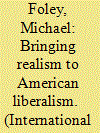

|
|
|
|
|
| Publication |
2009.
|
| Summary/Abstract |
Despite being a period of reputed liberal ascendancy and settlement in the United States, the 1950s also marked a time of considerable uncertainty, not least in the matter of America's own identity in relation to the rest of the world. Louis Hartz's quintessential depiction of US development threw into high relief the problematic nature of a liberalism that fluctuated between the two poles of principled withdrawal and transformative engagement. This article examines the social and political context of Waltz's Man, the State, and War in relation to the specific issue of the American liberal predicament during the emergence of the cold war. Waltz's work tapped into deep political insecurities generated by the onset of an apparently unstable and dangerous international order that threatened to be exacerbated by America's own indigenous ambiguity over its international position. Waltz illustrated a way by which it was possible for American liberalism, and thereby the United States, to achieve a stable and sustainable form of international involvement without falling prey to the violent swings between the Hartzian extremes of liberal overreaction. Waltz's kind of realism contained a positive core that implicitly addressed the issue of American engagement in the international system. In effect, the dynamics of international bipolarity had enhanced the possibility of diminishing the chronic nature of liberalism's own bipolarity.
|
|
|
|
|
|
|
|
|
|
|
|
|
|
|
|
| 2 |
ID:
110848
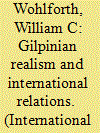

|
|
|
|
|
| Publication |
2011.
|
| Summary/Abstract |
I argue that realism in particular and IR more generally erred by assigning Kenneth Waltz's Theory of International Relations pride of place in revivifying realist thought. Had Robert Gilpin's War and Change in World Politics been given equal billing, international relations research would have unfolded quite differently over the past three decades. Scholars would not have been bewildered by change, bewitched by the balance of power, blind to numerous potentially powerful realist theories, and bothered by endless and unproductive zero-sum debates among representatives of competing paradigms. And had all those pathologies been absent, we would be far better prepared today for the intellectual and policy challenges of a world in which underlying power balances appear to be changing quickly, and the status quo inter-state order is ever more contested.
|
|
|
|
|
|
|
|
|
|
|
|
|
|
|
|
| 3 |
ID:
092038
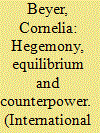

|
|
|
|
|
| Publication |
2009.
|
| Summary/Abstract |
This article claims that realist and constructivist ideas are compatible. Structural realism is needed to understand the constraining and stabilizing role of material factors. Furthermore, it detects process in a law-like tendency towards international power equilibrium which is achieved via balancing. Constructivism, in turn, highlights the importance of ideas and norms as engines for change and the creative role of agency. The article therefore combines a materialist and an idealist perspective. It both detects elements of stability and argues for necessary improvements in current international relations (IR) by looking at the issues of United States hegemony, the rise of new challengers and the threat of sub-state international terrorism. This article, therefore, takes up important claims made by Kenneth Waltz on realism, hegemony and terrorism, and interprets them in the light of IR theory today. It is argued that structural realism and Waltz's ideas are still important and viable, but that we need to combine them with additional perspectives, notably constructivism.
|
|
|
|
|
|
|
|
|
|
|
|
|
|
|
|
| 4 |
ID:
166027
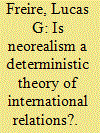

|
|
|
|
|
| Summary/Abstract |
This article is a contribution to the clarification of the central claim of Kenneth Waltz’s neorealist international relations theory. Over the years, the notion that Waltz’s Theory of International Politics postulates a deterministic connection between the configuration of the structure of the international system and the behaviour of each of the units has gained traction in textbooks and in straw-man critiques of the neorealist approach. Two major groups of critics of neorealism’s alleged determinism have formed. The first group focuses on instances where predicted balancing behaviour did not occur in order to refute neorealism’s central claim about the link between structure and behaviour. The second group objects to any strong claims about structural features as such. In response, this article shows that a careful reading of Waltz’s writings suffices to indicate that the presupposition adopted by both groups of critics is flawed. Neorealism was never presented by its main proponent as a deterministic international relations theory.
|
|
|
|
|
|
|
|
|
|
|
|
|
|
|
|
| 5 |
ID:
101517
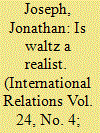

|
|
|
|
|
| Publication |
2010.
|
| Summary/Abstract |
In the opening chapter of Theory of International Politics Waltz makes an interesting distinction between scientific laws and theory construction. Recent special issues of this journal have suggested that this distinction allows Waltz to be read in different ways - for example, as a scientific realist who conceives of unobservable entities, or as a constructivist interested in how we create models. This contribution argues against both these interpretations by analysing the first chapter of Waltz's book and suggesting that his distinction between theories and law-like statements is fully consistent with mainstream discussions in the philosophy of social science. It argues that Waltz's position still depends on the identification of empirical regularities, something that makes him an empirical realist, but which undermines the claim that he is a scientific realist.
|
|
|
|
|
|
|
|
|
|
|
|
|
|
|
|
| 6 |
ID:
092035
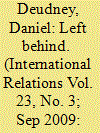

|
|
|
|
|
| Publication |
2009.
|
| Summary/Abstract |
Anarchy and the balance of power are the two core ideas in Waltz's neorealism, and he explicitly draws them from early modern political theory, particularly Hobbes and Rousseau. Unfortunately, Waltz leaves behind a key variable in these early modern state-of-nature arguments: violence interdependence - the capacity of actors to harm one another (independent of distribution of power). This difference between the extreme insecurity of the state of nature and the tractable insecurity of the state of war derives from different degrees of violence interdependence. The variable is implicit but powerful in Hobbes, and explicit in Rousseau's analysis of topographic fragmentation as a foundation for the European state system. As the effects of the industrial revolution made themselves felt, many theorists (the global geopoliticans, Carr and many liberals) continued to employ the variable Waltz dropped, and they generally argued that Europe had shifted from a state-of-war to a state-of-nature anarchy, thus posing the choice of catastrophe or integration. Herz and Morgenthau continue this argument in the nuclear era, reaching very different conclusions than Waltz. Similarly, the balance of power was conceived by early modern republican theorists as the counter to hierarchy, and this was transposed to the 'system level' via the device of referring to Europe as a whole as a 'republic' that was in part 'by nature'. Other important republican power restraints (notably division, mixture and union) were dropped by Waltz but are developed by liberal globalist security theory.
|
|
|
|
|
|
|
|
|
|
|
|
|
|
|
|
| 7 |
ID:
131711
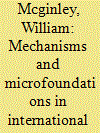

|
|
|
|
|
| Publication |
2014.
|
| Summary/Abstract |
This article looks at prospects for a mechanism-based research strategy in the study of International Relations. Over the past three decades, the notions of mechanism and microfoundation have taken a central place in discussions of explanation and 'micro-macro' problems in social science. The upshot of much of this discussion has been a call for mechanism-based explanations - explanations of macro-level phenomena in terms of micro-level mechanisms. Some work of this kind can already be found in IR theory, including in systemic research. However, a number of IR theorists, including Kenneth Waltz and Alexander Wendt, have argued that micro-oriented strategies like this will not work, pointing to incongruities between system- and unit-level phenomena. This article argues that these pose less hindrance to a fully-developed model of mechanism-based explanation, and that the field has much to gain from further exploration of this strategy. In particular, mechanism-based explanations could help bring structure back to the centre of discussion in IR theory, and might even give us a way out of the field's own micro-macro problems.
|
|
|
|
|
|
|
|
|
|
|
|
|
|
|
|
| 8 |
ID:
090147
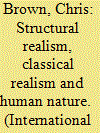

|
|
|
|
|
| Publication |
2009.
|
| Summary/Abstract |
Kenneth Waltz's Theory of International Politics is a modern classic, and deserves to be read the way classic texts ought to be read, i.e. in context and in its own terms. Recovering the context in this case is difficult because of the changes in the discourse since 1979, but one difference between the contemporary and the current reception of the text does seem clear - Waltzian structural realism (or neorealism) is now, but was not then, seen as breaking with the traditions of classical realism. How is this discontinuity to be understood? Part of the answer lies in the rhetoric employed by participants in this debate, but, more substantively, there is a genuine disagreement between neorealism and classical realism over the role played by human nature in international relations. Waltzian neorealism appears, contrary to the tradition, to reject any major role for human nature, describing theories that emphasise this notion as `reductionist'; however, on closer examination, the picture is less clear-cut. Waltz's account of human nature can be related quite closely to the major strands in the realist genealogy, but at a tangent to them. Interestingly, and perhaps unexpectedly, it is also compatible with at least some of the findings of contemporary evolutionary psychology.
|
|
|
|
|
|
|
|
|
|
|
|
|
|
|
|
| 9 |
ID:
090143
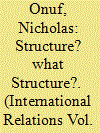

|
|
|
|
|
| Publication |
2009.
|
| Summary/Abstract |
Kenneth Waltz is a structural theorist. While scholars often comment on Waltz's conception of structure, they rarely address the philosophical assumptions behind it - assumptions that go back to Kant and finally to Aristotle. Appropriately situated, Waltz's conception of structure points to a strong version of constructivist social theory. To make my case, I trace Waltz's view of political structure in his early work, recapitulate his views on science, models and theory, address the question of his (or any) theory's relation to `reality', illustrate his difficulty with structural theory and institutional reality, and consider the vexed question of any theory's fit to a world already talked into existence. I show how close Waltz is to a philosophical position that solves his problem with theory's relation to reality and specifies the conditions under which any social theory can make sense or use of the term structure.
|
|
|
|
|
|
|
|
|
|
|
|
|
|
|
|
| 10 |
ID:
092036
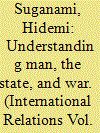

|
|
|
|
|
| Publication |
2009.
|
| Summary/Abstract |
This article expounds and assesses the key contentions of Man, the State, and War. It notes that the book contains meta-theoretical and theoretical components. Through a close re-examination of the text, the article shows how Waltz arrives at his third-image conclusion, reveals a number of errors of a conceptual or logical nature in the meta-theoretical moves that lead him to this conclusion, and explains how such errors are partly rooted in a deeper issue that the book addresses - how to integrate the three images (or three contending estimates of the major cause of war) into one overarching image of world politics based on the agent/structure dichotomy and the distinction between macro and micro enquiries. The article goes on to outline Waltz's substantive theory of international politics, found in an embryonic form in Man, the State, and War, speculates on the sources of the book's success, and assesses its main significance.
|
|
|
|
|
|
|
|
|
|
|
|
|
|
|
|
| 11 |
ID:
157783
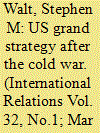

|
|
|
|
|
| Summary/Abstract |
This article uses realism to explain past US grand strategy and prescribe what it should be today. Throughout its history, the United States has generally acted as realism depicts. The end of the Cold War reduced the structural constraints that states normally face in anarchy, and a bipartisan coalition of foreign policy elites attempted to use this favorable position to expand the US-led ‘liberal world order’. Their efforts mostly failed, however, and the United States should now return to a more realistic strategy – offshore balancing – that served it well in the past. Washington should rely on local allies to uphold the balance of power in Europe and the Middle East and focus on leading a balancing coalition in Asia. Unfortunately, President Donald Trump lacks the knowledge, competence, and character to pursue this sensible course, and his cavalier approach to foreign policy is likely to damage America’s international position significantly.
|
|
|
|
|
|
|
|
|
|
|
|
|
|
|
|
| 12 |
ID:
092034
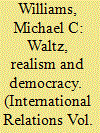

|
|
|
|
|
| Publication |
2009.
|
| Summary/Abstract |
Waltz is generally seen as one the most important advocates of a systemic theory of international politics that stresses the importance of international anarchy and marginalizes domestic politics. Locating Waltz's thinking against debates within realism in the 1950s, and drawing especially on his neglected Foreign Policy and Democratic Politics, this article argues that Waltz's thinking actually contains powerful domestic political dimensions that centre on a defence of democratic foreign policymaking. Rather than marginalizing domestic politics, Waltz's theory - and his critique of classical realism - is in part actually a subtle intervention in domestic politics.
|
|
|
|
|
|
|
|
|
|
|
|
|
|
|
|
|
|
|
|
|